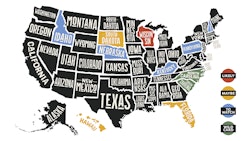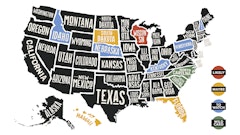
South Dakota voters will get yet another chance to legalize adult-use cannabis.
Secretary of State Monae L. Johnson announced June 3 that her office validated a petition for Initiated Measure 29 to appear on the Nov. 5, 2024, ballot. Cannabis advocacy group South Dakotans for Better Marijuana Laws (SDBML) submitted the measure.
A proposed state statute, the measure aims to amend South Dakota law to legalize cannabis use, possession and distribution for those 21 and older. It would not establish a commercial marketplace for licensed business operations like cultivation and retail, which makes it more likely to stand the test of the state’s single-subject rule.
“We firmly believe that South Dakotans deserve to make their own choices on how they live their lives, including the freedom to responsibly use cannabis,” SDBML Political Director Zebadiah Johnson said in a public statement.
SDBML submitted more than 29,000 signatures to Johnson’s office on May 7 and needed the secretary of state to validate roughly 60 percent of those signatures (17,508) to qualify for the ballot. Based on the results of a random sample, Johnson determined that 22,558 signatures, or nearly 78%, were valid.
This means South Dakota joins Florida in securing an adult-use legalization ballot question for the 2024 election. North Dakota (adult use) and Nebraska (medical) also have active ballot campaigns for this election cycle.
In South Dakota, 2024 marks SDBML’s third attempt to reform the state’s cannabis laws via the election process:
- In the 2020 election, South Dakota voters approved a constitutional amendment with 54.2% favoring reform. Still, that vote was overturned a year later when the state’s Supreme Court upheld a ruling that the amendment violated South Dakota’s single-subject rule. Gov. Kristi Noem paved the way for overturning the election results by launching a taxpayer-funded lawsuit challenging the constitutionality of the measure.
- In the 2022 election, South Dakota voters rejected a state statute to legalize adult-use legalization with 53% of voters opposing the measure on Election Day.
The 2022 letdown for cannabis legalization advocates came during a nonpresidential election, when voter turnout was low, which SDBML Executive Director Matthew Schweich attributed as a primary reason for defeat.
Specifically, South Dakota’s voter turnout was 59.4% in 2022, much lower than the 73.9% voter turnout in the 2020 election, according to the state’s Division of Elections.
“The conventional opinion is that when you’re going to run a cannabis-reform ballot initiative in a conservative-leaning state, you do so in a presidential (election) year,” Schweich told Keloland Media Group last month.
However, SDBML’s proposed 2024 initiated measure more closely aligns with the 2022 initiative in that it’s written for a state statute, as opposed to a constitutional amendment, and it does not establish a regulated and taxed marketplace. This is partly to help avoid another lawsuit challenging the measure’s constitutionality in connection to the state’s single-subject rule, according to SDBML.
Under the 2024 ballot measure, adults 21 and older would be allowed to possess up to 2 ounces of cannabis, 16 grams of cannabis concentrate or 1,600 milligrams of THC. Also, they would be able to grow up to six plants for personal use with a limit of 12 plants per household.
Other key provisions included in the proposal, as outlined by the secretary of state’s office and previously reported by Cannabis Business Times, are:
- The measure restricts where individuals may possess or consume cannabis, such as near schools or where tobacco is prohibited.
- The measure allows employers to restrict an employee’s use of cannabis. Property owners may also regulate the use of cannabis on their property.
- The measure does not affect state laws dealing with hemp. It also does not change laws concerning the state’s medical cannabis program.
- The measure legalizes cannabis-derived substances considered felony-controlled substances under state law. Cannabis remains illegal under federal law.
Through legalizing the possession of 2 ounces of cannabis—currently a Class 1 misdemeanor in South Dakota that carries the possibility of up to one-year imprisonment—the state could save nearly $600,000 per year in incarceration expenses for cannabis-related offenses, according to a fiscal note by Reed Holwegner, director of South Dakota’s Legislative Research Council.


























